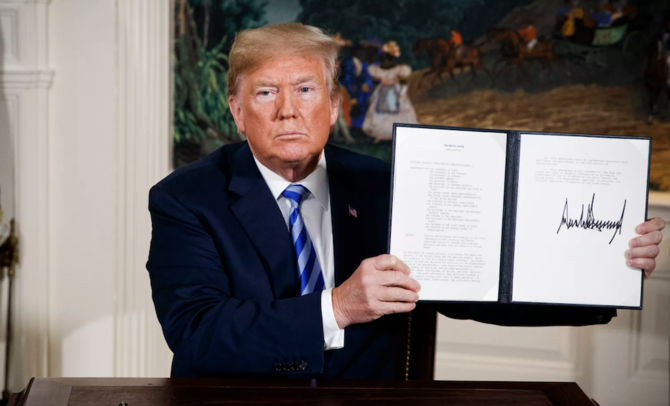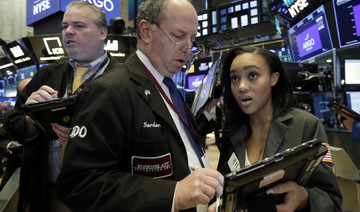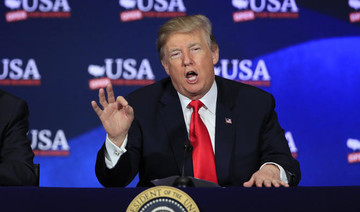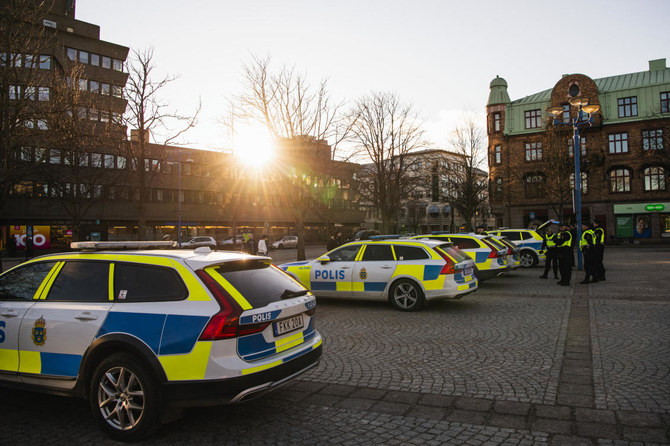WASHINGTON: Donald Trump last night pulled the United States out of an international nuclear agreement with Iran and ordered hard-hitting sanctions to be reimposed on the country.
The US president had long pledged to tear up “the worst deal in history,” but any hopes that he may leave a door open to save the agreement were dashed with a searing critique of the deal and condemnation of Tehran as the leading state sponsor of terror.
“I am announcing today that the United States will withdraw from the Iran nuclear deal,” Trump said at the White House. “In a few moments, I will sign a presidential memorandum to begin reinstating US nuclear sanctions on the Iranian regime. We will be instituting the highest level of economic sanctions."
The Joint Comprehensive Plan of Action signed in 2015 with world powers placed restrictions on Iran’s nuclear program in exchange for a waiver on sanctions that had crippled the country’s economy.
But Trump said it was a “horrible one-sided deal that should have never, ever been made.
“We cannot prevent an Iranian nuclear bomb under the decaying and rotten structure of the current agreement.
“If we do nothing, we know exactly what will happen. In just a short period of time, the world’s leading state sponsor of terror will be on the cusp of acquiring the world’s most dangerous weapons.”
Trump and other critics of the Obama-era deal, including Saudi Arabia, say the agreement fails to address Iran’s ballistic missile program and has empowered Tehran to continue its expansive foreign policy in countries such as Syria and Yemen.
Saudi Arabia said it supported Trump’s decision to withdraw from the deal, which the Kingdom had previously supported based on the belief “that it would limit the proliferation of weapons of mass destruction.”
“However, Iran exploited the economic benefits of lifting sanctions and used it to continue its destabilizing activities in the region, especially through the development of ballistic missiles, and its support for terrorist groups, including Hezbollah and the Houthi militia,” the government said.
Riyadh accused Iran of using these capabilities to target civilians in the Kingdom — a reference to ballistic missiles that have been fired at Saudi Arabia by Iran’s allies in Yemen.
Trump repeatedly referred to Iran’s actions in the region as evidence that the deal is “defective at its core.”
“After the sanctions were lifted, the dictatorship used its new funds to build nuclear capable missiles, support terrorism, and cause havoc throughout the Middle East and beyond,” Trump said.
In response, Iran’s President, Hassan Rouhani, one of the main backers of the deal inside Iran, said his country would remain committed to the agreement.
“If we achieve the deal’s goals in cooperation with other members of the deal, it will remain in place... By exiting the deal, America has officially undermined its commitment to an international treaty,” he said.
Rouhani said he had ordered his foreign ministry to negotiate with European countries, China and Russia in coming weeks.
Trump said the US would institute “the highest level” of economic sanctions and that any country that “helps Iran in its quest for nuclear weapons could also be strongly sanctioned.”
The US Treasury said there will be “certain 90-day and 180-day wind-down periods,” but didn’t specify which sanctions would fall under which timelines.
At the end of those periods, the sanctions would be in “full effect.”
The decision creates a major rift between the US and Europe, which lobbied hard for Washington to stay in the deal.
The European Union’s diplomatic chief, Federica Mogherini, said the EU is “determined to preserve” the deal if Tehran sticks to its commitments.
The accord “is delivering on its goal, which is guaranteeing that Iran doesn’t develop nuclear weapons,” Mogherini said.
Britain, Germany and France urged the US not to take steps that would make life harder for other countries that still wanted to stick to the deal.
“We urge the US to ensure that the structures of the JCPOA (deal) can remain intact,” the leaders of Britain, Germany and France said in a joint statement.
Israel, one of the deal’s biggest critics, described Trump’s decision as “historic.”
Benjamin Netanyahu last week claimed a trove of documents seized in Iran showed that Tehran had lied about not wanting to seek an atomic weapon.
He said leaving the Iran deal unchanged would be “a recipe for disaster, a disaster for our region, a disaster for the peace of the world.”
Trump used his statement to offer an alternative scenario to Iran by highlighting the progress made in negotiations with North Korea. He said Secretary of State Mike Pompeo was on his way to North Korea to lay the groundwork for the anticipated summit with Kim Jong-un.
He said Iran’s leaders “are going to want to make a new and lasting deal, one that benefits all of Iran and the Iranian people.”
The JPCOA took years to negotiate and includes complex layers of timelines, inspection regimes and sanctions relief. The full extent of what the US withdrawal means for banks and businesses is still unclear.
“After withdrawal, the next question is: What is the next target? Is it a better nuclear deal? Is it regime collapse, or gaining leverage or signalling?” Behnam Ben Taleblu, research fellow at the Foundation for the Defense of Democracies in Washington, told Arab News.
“The president is well-known for his strong belief that you should take a bad deal and turn it into a good deal, so is he going to fix it, mix it or nix it?
But there are also fears that the US withdrawal could escalate tensions in the region where Iran’s forces and proxies are increasingly antagonizing rival countries.
“He (Trump) is manufacturing a crisis that has serious ramifications for further instability in the Middle East in terms of potentially witnessing nuclear proliferation, not just from Iran, but also other states and also seeing a potential escalation of tensions in Middle East, particularly between Israel and Iran,” said Dr. Sanam Vakil, associate fellow at Chatham House’s Middle East and North Africa Programme.




























